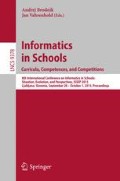Abstract
Much of what we can do with Computer Science seems like magic, such as searching billions of items in a fraction of a second, or decrypting a secure message without needing to know the key that was used to encrypt it. Other parts are surprising — surely given a fast enough computer we can find the optimal solution to a problem? This paper investigates magical and paradoxical ideas in computer science, and how these relate to Computer Science education.
Access this chapter
Tax calculation will be finalised at checkout
Purchases are for personal use only
Preview
Unable to display preview. Download preview PDF.
References
Microbytes: instant gigabytes? Byte Magazine 17(6), 45 (1992)
Bell, T.: A low-cost high-impact computer science show for family audiences. In: Australasian Computer Science Conference 2000 (ACSC 2000), Canberra, Australia, January 31-February 3, pp. 10–16 (2000)
Bell, T.C., Witten, H.I., Fellows, M.: Computer Science Unplugged: Off-line activities and games for all ages (original book) (1999), http://csunplugged.org
Bueno, C.: Lauren Ipsum: A Story About Computer Science and Other Improbable Things. No Starch Press (2014)
Curzon, P., McOwan, P.W.: Engaging with computer science through magic shows. In: Proceedings of the 13th Annual Conference on Innovation and Technology in Computer Science Education, ITiCSE 2008, pp. 179–183. ACM, New York (2008)
Duncan, C., Bell, T., Tanimoto, S.: Should your 8-year-old learn coding? In: Proceedings of the 9th Workshop in Primary and Secondary Computing Education - WiPSCE 2014, pp. 60–69. ACM Press, New York (2014)
Furber, S. (ed.): Shut down or restart? The way forward for computing in UK schools. The Royal soceity, London (2012)
Gibson, B., Bell, T.: Evaluation of games for teaching computer science. In: The 8th Workshop in Primary and Secondary Computing Education (WiPSCE 2013) (2013)
Hess, K.L., Papalaskari, M,-A., Weinstein, R., Styer, R., Way, T., Lagalante, A.: Special session-creation of the milwaukee school of magic. In: 37th Annual Frontiers in Education Conference-Global Engineering: Knowledge Without Borders, Opportunities Without Passports, FIE 2007, pp. S1F–1. IEEE (2007)
Hromkovic, J.: Algorithmic Adventures: From Knowledge To Magic. Springer, Heidelberg (2009)
Kubica, J.: Computational Fairy Tales. CreateSpace Independent Publishing Platform (2012)
Kubica, J.: Best Practices of Spell Design. CreateSpace Independent Publishing Platform (2013)
Lee, I., Martin, F., Apone, K.: Integrating computational thinking across the K-8 curriculum. ACM Inroads 5(4), 64–71 (2014)
Rushkoff, D.: Program or be programmed: Ten commands for a digital age. OR Books (2010)
Schulte, C., Knobelsdorf, M.: Attitudes towards computer science – computing experiences as a starting point and barrier to computer science. In: Proceedings of the Third International Workshop on Computing Education Research – ICER 2007, p. 27. ACM Press, New York (2007)
Seehorn, D., Carey, S., Fuschetto, B., Lee, I., Moix, D., O’Grady-Cunniff, D., Owens, B.B., Stephenson, C., Verno, A.: CSTA K-12 Computer Science Standards: Revised 2011. Technical report, New York (2011)
Upton, E., Veloso, M., Gadgil, A., White, T., Monks, B., Malkin, R.: Today’s engineering heroes. IEEE Spectrum 52(3), 39–49 (2015)
Werner, L., Denner, J., Campe, S., Kawamoto, D.C.: The fairy performance assessment. In: Proceedings of the 43rd ACM Technical Symposium on Computer Science Education - SIGCSE 2012, p. 215. ACM Press, New York (2012)
Author information
Authors and Affiliations
Corresponding author
Editor information
Editors and Affiliations
Rights and permissions
Copyright information
© 2015 Springer International Publishing Switzerland
About this paper
Cite this paper
Bell, T. (2015). Surprising Computer Science. In: Brodnik, A., Vahrenhold, J. (eds) Informatics in Schools. Curricula, Competences, and Competitions. ISSEP 2015. Lecture Notes in Computer Science(), vol 9378. Springer, Cham. https://doi.org/10.1007/978-3-319-25396-1_1
Download citation
DOI: https://doi.org/10.1007/978-3-319-25396-1_1
Published:
Publisher Name: Springer, Cham
Print ISBN: 978-3-319-25395-4
Online ISBN: 978-3-319-25396-1
eBook Packages: Computer ScienceComputer Science (R0)

